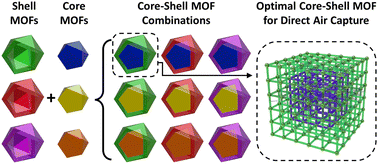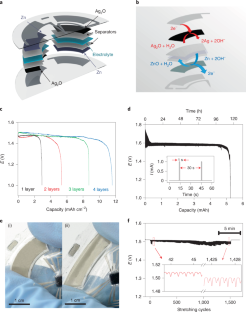空気を直接捕捉するのは難しい: ピットの研究者は、大気中の二酸化炭素を選択的に捕らえる新材料を設計している。 Direct air capture is hard to do. Pitt researchers are designing new materials that selectively catch carbon dioxide in the atmosphere
2022-10-06 ピッツバーグ大学
MOFはコア-シェル構造をしており、二酸化炭素はコアに閉じ込められ、シェルは他の気体、特に水を遮断することができる。シェルとコアは異なるMOF材料でできており、シェルMOFは水を減速させ、コアMOFは二酸化炭素と結合するように設計されている。
現在、研究グループは、計算モデリングを用いて、MOFのコアとシェルの両方に最適な材料の候補を選別しているところである。
<関連情報>
- https://news.engineering.pitt.edu/getting-it-to-stick-grabbing-co2-out-of-the-air/
- https://pubs.rsc.org/en/journals/journalissues/nr#!recentarticles
空気の直接捕集に最適なコアシェル型MOFの設計 Designing optimal core–shell MOFs for direct air capture
Paul Boone, Yiwen He,Austin R. Lieber, Janice A. Steckel, Nathaniel L. Rosi, Katherine M. Hornbostel and Christopher E. Wilmer
Nanoscale Published:23 Aug 2022
DOI:https://doi.org/10.1039/D2NR03177A
Abstract
Metal–organic frameworks (MOFs), along with other novel adsorbents, are frequently proposed as candidate materials to selectively adsorb CO2 for carbon capture processes. However, adsorbents designed to strongly bind CO2 nearly always bind H2O strongly (sometimes even more so). Given that water is present in significant quantities in the inlet streams of most carbon capture processes, a method that avoids H2O competition for the CO2 binding sites would be technologically valuable. In this paper, we consider a novel core–shell MOF design strategy, where a high-CO2-capacity MOF “core” is protected from competitive H2O-binding via a MOF “shell” that has very slow water diffusion. We consider a high-frequency adsorption/desorption cycle that regenerates the adsorbents before water can pass through the shell and enter the core. To identify optimal core–shell MOF pairs, we use a combination of experimental measurements, computational modeling, and multiphysics modeling. Our library of MOFs is created from two starting MOFs-UiO-66 and UiO-67-augmented with 30 possible functional group variations, yielding 1740 possible core–shell MOF pairs. After defining a performance score to rank these pairs, we identified 10 core–shell MOF candidates that significantly outperform any of the MOFs functioning alone.




